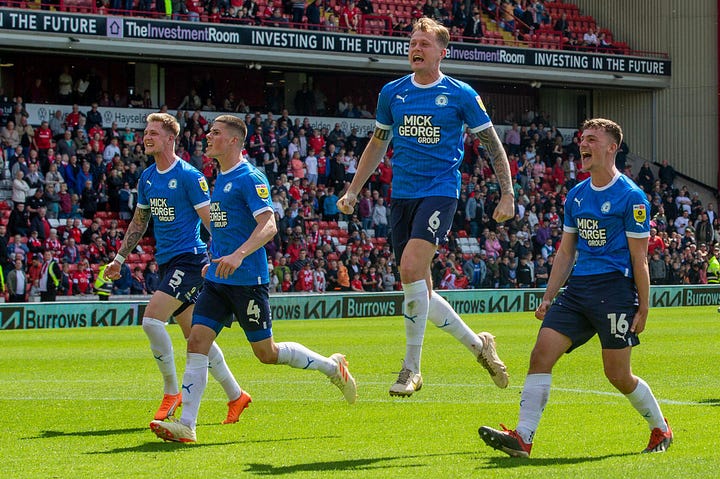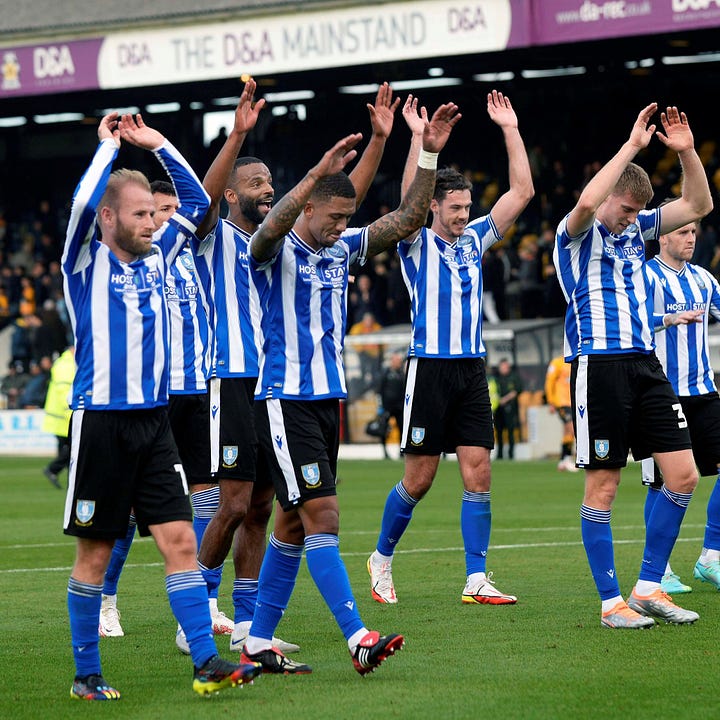Playoff Preview: Peterborough United vs Sheffield Wednesday
A look ahead to the pick of the League One playoff ties


Every playoff tie is exciting, but the 3rd vs 6th matchup is catnip for amateur psychologists. Will the momentum built up by the team that has snuck into the end-of-season lottery at the last moment be enough to overcome their opponents who proved to be stronger over 46 games but are somewhat disappointed not to have already secured their place in a higher division?
Despite knowing their fate before final day began, Sheffield Wednesday can rightly feel aggrieved to have missed out on automatic promotion on 96 points. That total would have won them the league in each of the previous four seasons, however it was only enough for third place this time. Meanwhile, Peterborough United secured a stunning victory at Barnsley on Sunday to finish on 77 and propel themselves into sixth position ahead of Derby County, a reward for their clear improvement since the January return of Darren Ferguson in the dugout.
Based on their head-to-head record in the regular campaign, both teams will have their reasons to be confident. In their first meeting back in August, Posh comfortably won 2-0 at London Road after Wednesday defender Reece James was sent off within 35 minutes. The Owls avenged this defeat with a 1-0 victory at Hillsborough, a result which flattered the visitors, who failed to register a shot on target.
The case for Sheffield Wednesday:
Wednesday usually line up in a 3-4-1-2 system and their strengths are almost tailor-made to exploit Peterborough’s deficiencies. Up front, Michael Smith is a match for any defender in an aerial duel and despite being comfortable on the ball, neither Ronnie Edwards nor Frankie Kent in the Posh defence are particularly adept in these scenarios. In the regular season Wednesday attempted 1000 completed crosses (a total bettered only by Derby) and it is therefore a fair assumption that manager Darren Moore’s gameplan will be for his players to spread the ball towards the wingbacks Liam Palmer and Marvin Johnson and encourage them to provide ammunition for the aerially dominant Smith. Throw in Barry Bannan’s pinpoint delivery from midfield and the Wednesday striker will not be short of service.
Moore can be also confident that his own team’s weaknesses won’t be as effectively targeted. Since Mark McGuiness departed in January and was replaced by Aden Flint, the Owls have looked less assured passing the ball around the backline and become incredibly vulnerable when facing high energy opposition. This flaw was a crucial factor in the back-to-back defeats at Barnsley and Forest Green in late March.
However, Peterborough’s pressing statistics are unremarkable, ranking 11th in the division for passes per defensive action (PPDA.) Striker Jonson Clarke-Harris offers little off the ball, meaning that Flint and right-sided centre-back Dominic Iorfa will be afforded crucial extra seconds on the ball each time they receive it, giving them more time to play passes into midfield and down the flanks.
Not only is Flint unlikely to be as exposed by Peterborough’s forwards as he has by the attackers from other teams, but he is also well-equipped to deal with their main strengths. Posh themselves have registered the third-highest number of crosses this season so what happens in the air will be just as important as the goings-on on the ground in the tie. Although the lethal Clarke-Harris has bullied many a League One defender and can hold the ball up as well as anybody, at 6ft 4in Flint has the physical attributes to nullify these threats and marshal him in a way that few others have been able to. The Stoke City loanee can cause damage from set pieces at the other end of the pitch too and is yet another imposing figure that Edwards, Kent and their teammates will have to stop from meeting one of Bannan’s crosses.
The case for Peterborough United:
It would be foolish to suggest that Peterborough’s attack won’t pose problems for Wednesday to solve. In all three of Darren Ferguson’s previous stints as manager, Peterborough were better going forward than in defence and since his January return, this has been the case yet again. Clarke-Harris has unsurprisingly thrived, taking his total to 26 goals for the season, and versatile 24-year-old Jack Taylor has contributed from a variety of different midfield positions.
Results have swung wildly, especially at London Road, where home fans witnessed their team demolish eventual champions Plymouth Argyle 5-2 in February, just a fortnight after sinking to a humiliating 5-0 defeat against Bolton Wanderers. Positive outcomes have been the more common occurrence though; the 3-0 victory at Lincoln City and last week’s triumph over Barnsley provided further evidence of the extremely high ceiling Posh’s performance levels can reach.
The array of attacking talent at his disposal as well as the skillset of his centre-backs dictate that instead of mitigating against the inevitable aerial bombardment, Ferguson’s best option will be to give Wednesday something to worry about at their own end.
Should he feel compelled to throw a spanner in the works, swapping his wingers could be a way to target the opposition personnel. Left-winger Ephron Mason-Clark’s pace and direct running is likely to cause more problems to Wednesday’s left-sided centre-back Reece James than the more athletic Dominic Iorfa on the other side. Similarly, Kwame Poku’s superior dribbling ability may be better utilised from the left, as a means of forcing an error from Iorfa, who is no stranger to the occasional lapse in concentration.
One downside to this potential ploy is that a big part of Poku and Mason-Clark’s threat is their willingness to cut inside and occupy more central positions. Switching wings would blunt that weapon and given that Clarke-Harris is not the most mobile of strikers, moving the two wide forwards further away from him may leave him isolated. Even so, this swap could bring benefits if deployed for a limited time, perhaps to force an early yellow card for either Wednesday defender and set the tone early in the match, particularly in the first leg.
Whichever side the forwards start on, playing their 4-2-3-1 against a 3-4-1-2 gives Peterborough an opportunity to press home an advantage if they start aggressively and create a 3vs3 battle in Wednesday’s half between the forward line and centre-backs. In turn, this would pin the Owls wingbacks into a more defensive position and cut off two of the key supply lines feeding crosses to Michael Smith.
Playing at Hillsborough in the second leg may benefit Posh too. Sheffield Wednesday have contested four playoff semi-finals since 2004, winning both ties in which they were away in the second leg and losing on the two occasions when the return fixture took place in S6.
While the individuals putting on the blue and white shirt have changed between then and now, the large attendances they attract haven’t. With scepticism over Darren Mooore’s in-game management rife among the fanbase as well as concern that an ageing squad may struggle to match their points haul next season should they fail to be promoted, the pressure will be ramped up even higher than usual for the Owls. If Peterborough can take a narrow lead into the second leg, the presence of over 30,000 nervous Wednesdayites may cancel out the home advantage on Thursday.
Prediction:
Even considering the 19-point gap between the sides in the final table, the tie is certainly not a foregone conclusion. Peterborough can blow anybody away and an expectant Hillsborough could prove more of a hindrance than a help for Sheffield Wednesday but the tactical matchup favours Darren Moore’s men. The Owls to progress with an away draw and home victory.
Do you agree? Comment below which team you think will progress to the final.






